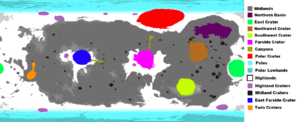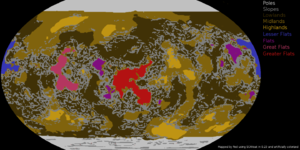Biome
A biome is geographically contiguous area on the surface of a celestial body. They yield different experimental data (and flavor text). Currently[outdated], only the Kerbin System, consisting of Kerbin and its moon Mün and Minmus, have biomes. Taking data at different altitudes (including 'on the ground', i.e. surface samples) over different biomes reveals different scientific results.
Biomes on the celestial bodies
If a body has specific biomes for the poles, the scientific results for both poles are the same. For example the north and south polar caps of Kerbin are the same biome called Ice Caps.
Kerbin
The planet Kerbin has 9 to 12 different biomes. Unlike Mun where the biomes extend into space, the biomes KSC, Runway and Launch Pad can only be detected on the surface. As soon as the measurement is not taken on the surface, it will report the biome Shores.
The Water biome is only present on large water bodies. Most rivers and smaller lakes are the same biome as the ground around them.
- Launch Pad
- Runway
- KSC
- Grasslands
- Ice Caps (Polar biome)
- Tundra
- Mountain
- Badlands
- Desert
- Water (Oceans)
- Highlands
- Shores
Mun
- Canyons (Extend off of the major craters.)
- East Crater
- East Farside Crater
- Farside Crater
- Highland Craters
- Highlands
- Midland Craters
- Midlands
- Northern Basin
- Northwest Crater
- Polar Crater
- Polar Lowlands (Polar biome)
- Poles (Polar biome)
- Southwest Crater
- Twin Craters
Minmus
- Highland
- Midlands
- Lowlands
- Slopes
- Flats
- Great Flats
- Greater Flats
- Lesser Flats
- Poles
Laythe
- Water
- Land
Other
All other celestial bodies have only one biome for the complete body. This will most likely change in the future.


